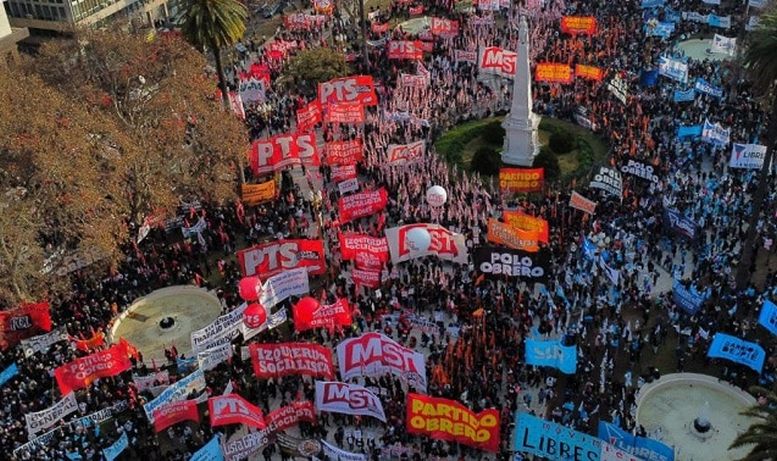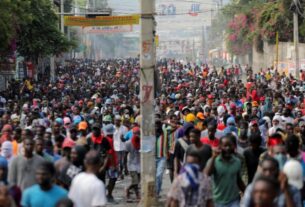Marcos Ariel is a member of Alternativa Socialista (ISA in Argentina).
The Finance Minister and candidate of Unión por la Patria recovered from defeat in the Primaries where he had obtained 27.27% and this time he won, with 36.63%.
La Libertad Avanza, Milei’s party, this time did not advance, obtaining 30.02%, practically the same votes as in the Primaries.
The opposition front of former right-wing President Macri, Juntos por el Cambio (Together for Change), lost overwhelmingly, obtaining 23.83% (it got 28.27% in the Primaries). It is the big loser of the first round and its candidate, Patricia Bullrich, was left out of the second round.
The Frente de Izquierda (Left Front) came in fifth place with 2.69%, maintaining the votes it won in the Primaries, which was enough to add one MP in the City of Buenos Aires and one national MP.
The right-wing Peronist, Juan Schiaretti, came in fourth place with 7.6%.
Far-right Shows its Ugly Face
The general elections were held in the midst of a deepening economic crisis that punishes workers and the poor, with an inflation rate of around 140% per year, poverty of 40% and a record devaluation of the national currency, where the value of the dollar increased from 300 pesos to 1000 pesos in one year.
It is precisely because of this serious situation, which is the responsibility of the current government and the previous government of Juntos por el Cambio (Together for Change), that in the August primary elections the ultra-right-wing Javier Milei won with his rhetoric against the “political caste” and proposal to end the crisis with the dollarization of the economy.
Euphoric with their triumph, the candidates of Libertad Avanza publicly unleashed their proposals of direct attacks against the working class and democratic rights. Thus, Milei opposed labor rights, stating that “social justice is theft” and that, for example, severance pay, sick leave, etc., should be ended and pensions should be privatized.
In his eagerness to privatize, he attacked CONICET (National Council of Scientific and Technical Research) which is a state institution of great scientific prestige and also attacked free public university, with the slogan “pay for the university, you lazy bum.”
To their anti-legal abortion stance, they also added the denial of the gender gap at work. They proposed that men be able to “renounce paternity” and refuse to maintain their children and attacked the LGBTIQ+ community by saying that being gay is like being sick or having a disability.
In a country where the genocide of the military dictatorship is not forgotten, they denied the genocide saying that there was a war where there were only “some excesses” by the military. They even touched on very sensitive fibers in the Argentine people, denying sovereignty over the Malvinas Islands.
Milei’s celebration of the brutal devaluation that took place in the week prior to the elections and his statements in favor of the increase in the price of the dollar because “the more the dollar rises, the better it will be to dollarize” went down very badly with the population because we know that when the dollar rises, the price of food also rises.
Massa capitalises on rejection of Milei
Massa’s electoral comeback can be explained, basically in that he capitalized on the rejection of Milei’s “madness.” The fear that “everything might explode” encouraged a sector that did not vote in the Primaries to do so this time, so that the turnout increased from 69.62% to 77.67%. On the other hand, he added the moderate votes of Rodriguez Larreta who lost the primary election in Juntos por el Cambio to Patricia Bullrich who has a similar profile to Milei.
Massa also took some economic measures which, although partial and limited, served to mitigate a little the suffering of the working class, such as refunding 21% VAT, the elimination of the income tax for workers, the granting of a subsidy to informal workers, and credit at low interest rates, among others.
On the political side, Massa, on the one hand, promoted a “campaign of fear” by agitating that an eventual victory of Milei would automatically mean the loss of all rights. On the other hand, he tried to totally dissociate himself from Personist President Alberto Fernández, making him responsible for all the “mistakes” and also from Vice President Cristina Kirchner, who kept silent during the whole campaign.
In view of the second round, to be held on November 19, both Massa and Milei will seek the votes of Juntos por el Cambio, whose electoral defeat has plunged it into a crisis of no return. Their votes will go partly to Massa and partly to Milei, who will take votes from the most right-wing sector who, like Macri, do not hide their sympathy for his libertarian ideas.
Undoubtedly, this electoral process deepens the political crisis of the system. On the one hand, the disintegration of Juntos will remove a leg from the two-party/coalition system, with which the bourgeoisie governed after the deep crisis of the Argentinazo in 2021.
But it will also be the end of the Peronist coalition. Massa himself has already announced that if he wins the presidency he will form a government of “national unity” adding “the best of each political party,” that is to say, the remnants of the right wing that today makes up Juntos por el Cambio.
It is clear that a Milei presidency would mean an attack on the working class, but if the far-right emerges and has possibilities of governing it is the responsibility of Peronism which disappointed all expectations, but also of the trade union bureaucracy which has been an accomplice of government austerity during all these years.
But the electoral reaction against Milei’s ultra-right is an expression that there are reserves to fight the far-right, even if the one who is capitalizing electorally is one of those directly responsible for austerity.
Milei’s reactionary positions should not make us forget that Massa is the minister of austerity and if he finally wins, he will be the president of the deepening of austerity. Because it is not possible to govern for the benefit of big business and, at the same time, for the benefit of the workers, it is not possible to govern for the IMF and for the people. Either one governs for one or for the other. In his proposal to add the right wing to his government of national unity he has already made clear the nature of his possible government.
Working class must prepare for struggle
For that reason, whoever wins the second round, the workers and the people will have to fight in defense of our rights and so that the crisis is paid by those who caused it, the capitalists.
In this sense, it is important that the Frente de Izquierda maintained its votes from the Primaries and has managed to add an MP in the City of Buenos Aires and a national MP to the four it already had. This shows that, in spite of an electoral shift to the right, the unity of the left has potential, although unfortunately it is limited to the electoral field.
In order to organize the struggles that sooner or later the working class will wage, we need a left that is united not only electorally but fundamentally in the daily struggles of the working class.
On this road we need to build a Socialist Alternative in Argentina because the next president will deepen the capitalist model through which the few benefit, the super rich who are becoming richer every day while the workers are getting poorer.



